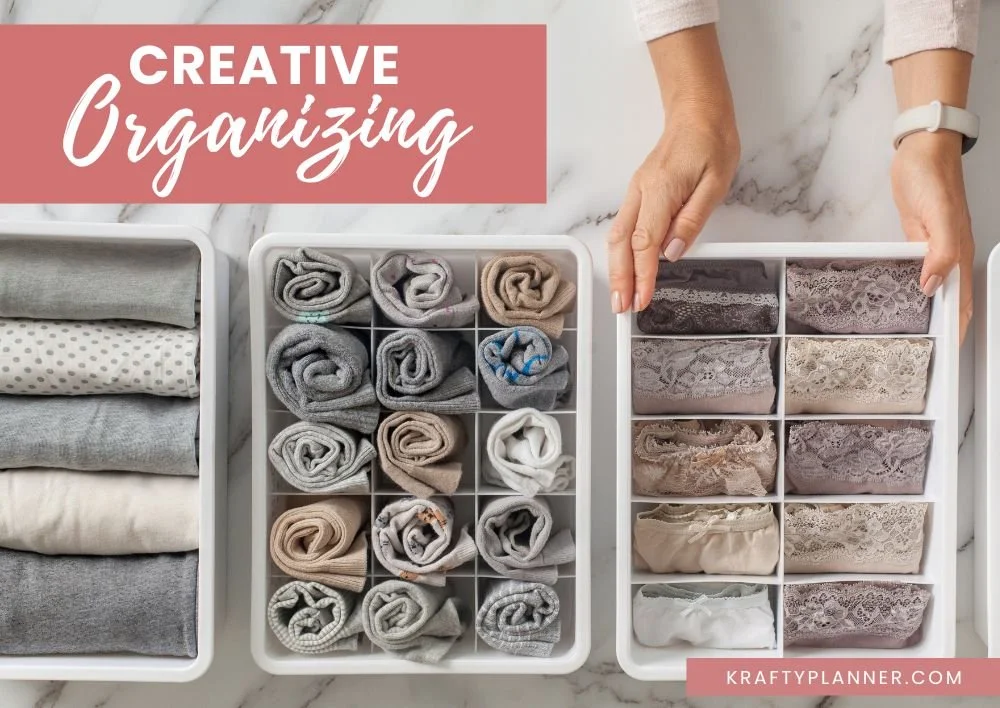How to Maintain an Organized Home: 9 Tips for Success
It can be so discouraging to get your home organized and then watch helplessly as the clutter makes its way back in. How does that happen?
It's basically a mindset - to get organized is one thing, but to stay that way means you need to approach each day with it in mind.
Rather than give up, try working some habits into your family life to make organization stick around.
Here are some tips for getting organized and staying that way.
Grow with Your Family
Organization needs to change over time, and it's good to be adaptable and change methods along the way.
One of the ironies of staying organized is that rigid inflexibility tends to make things worse - if not in actual clutter, then in feelings of resentment and being stifled.
So it only makes sense that you will have to "update" your organization from time to time to keep up with growing kids, changing jobs, and various phases.
Here are some tips.
Toy bins will need to make way for space for age-appropriate items, like journals, art supplies, electronics, and other teen interests. You can update the bins or sell the old ones and replace them, but it's going to require some reorganizing as your kids grow.
Get rid of the old to make space for the new. Nothing scraps organizational efforts like accumulating stuff on top of stuff. As your kids' interests change (yours, too), don't be afraid to get rid of the things you no longer use and create space for the new stuff.
As your kids grow, the level of organization they are responsible for will increase. Begin to delegate tasks and try to let family members do it their own way. This is part of letting organization grow with your family.
Personalize It
If you are using organizational methods that just aren't you, or just don't fit with your family dynamic, then it's no wonder you can't keep up with them.
You may not be the type to do spreadsheets, for instance, even though your friends rave about how much they helped them. If a dry-erase board or piece of paper and pencil work for you, go with it. Some people do better with an old-fashioned pocket calendar than fancy software.
The same is true in your home. If you are using the methods others have told you about, they may not work for your family.
Organization should flow naturally from your lifestyle and be at a level you're comfortable with. It's okay if there are some things you prefer not to have too organized.
The Need for Space
Space needs definitely change within a family.
Babies, for instance, take up little space in and of themselves, but their stuff can take over the house!
Teens, for example, may need more personal space but fewer square feet than, say, an active first grader.
Even the adults in the house may go through phases where personal space is more of a priority than at other times. So be ready for these changes and adapt your organizational methods to fit them.
9 More Tips to Help You Stay Organized Every Day
Being organized should be a way of life and second nature to you. That way it's a habit rather than a chore.
Of course, it takes time and effort to create the habit in the first place but once you've achieved it you want to stay that way.
These nine tips will help you to stay organized every day with very little effort or fuss.
Check-In
Start your day by checking your schedule and your to-do list. It may be that you've thought of something you need to add. Prioritize your to-do list so that you tackle the important items first.
Plan
As well as your to-do list you should plan your day. Include calls, meetings, chores, and goals. You can use pen and paper, a planner (a bullet journal is ideal), or a planning app. Don't forget to include scheduled breaks. Make sure to include time for friends and family.
The F.A.R. Rules
The F.A.R. Rules are essential for helping you to stay organized. They apply equally to your personal life as well as your business.
File it - if it's important and needs to be kept (either in paper or electronic form) then file it immediately.
Act on it - if something needs to have action taken, for example, paying a bill or making a call, then do it immediately. Then either file or recycle it.
Recycle it - whether it's junk mail or papers and items you've finished with, recycle it immediately once it's no longer needed.
These rules apply to emails as well as paperwork. By following them you can keep your inbox under control.
Digital Aids
At times technology can be a distraction but there are some items that can help you become and stay productive. However, choose your devices and solutions with care so that you don't create more of a problem for yourself.
For example, you may decide that an app to monitor your health and fitness would be a good idea to keep you on track with your goals. There are also menu planning apps, scheduling, time, and project management, as well as household organization apps.
Track
To be successful with your organization skills you need to track and monitor your progress.
What's working and what's not? Be prepared to make changes and adjustments to how you do things. Just because one method of organizing your closet doesn't work for you it doesn't mean that another won't.
Trash It
Don't keep things for the sake of it. If it's not useful or necessary then throw it out. If you are keeping it then remember to put it away. That way you keep your surroundings free from clutter and distractions.
Identify
Keep a track of what works for you and keep on doing it. If something hasn't been successful then identify what needs to be changed and do it that way the following day.
5 Minute Review
Just like you started your day, end your day with a five-minute review. Celebrate your accomplishments and cross off everything you've achieved from your to-do list. Remove any inessential or unimportant tasks that are still remaining. Whatever is left should be added to the next day's list.
To-Do List
Create your to-do list for the following day. Include any important tasks that you didn't complete that day and only important items that need to be done.
Try and limit your list to 10 items or less so that you don't feel overwhelmed or end the day with a list of unaccomplished items.
Conclusion
Maintaining an organized home requires consistency, adaptability, and mindful habits that fit your lifestyle and family’s changing needs. You can create a functional and organized environment by regularly decluttering, personalizing your methods, and adjusting your space for different phases of life.
Simple strategies like checking in with your daily to-do list, implementing the F.A.R. rules, using digital tools wisely, and throwing away unnecessary items help keep clutter at bay.
Additionally, ensuring your home is clean and well-maintained means pests can’t hide, making your space organized and safe. Staying organized takes effort, but with these tips, it can become a sustainable habit.
Becoming and staying organized doesn't happen overnight and it does require regular effort. However, you can stay on track by following these nine tips. You can be organized every day with a little planning, time, and effort.
Before You Go:
Here are a few more posts you might like:
SHARE YOUR THOUGHTS!
Did you find this article helpful? I’d love to hear about it! Feel free to post questions in the comments below. Thanks!
See my Link Party Directory for a current list of blog parties I attend each week.
This post was featured at the following link parties, thank you for your support! ❤️









